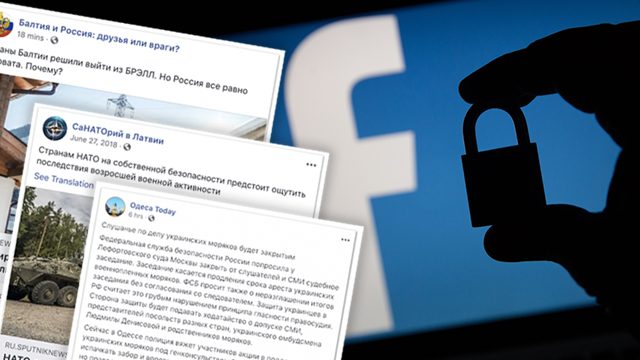SUMMARY
This is AI generated summarization, which may have errors. For context, always refer to the full article.

MANILA, Philippines – Facebook announced Thursday, January 17, it has removed a total of 471 Russia-linked Facebook pages and accounts, as well as 41 Instagram accounts because of what it deemed “coordinated inauthentic behavior.”
According to Nathaniel Gleicher, head of cybersecurity policy at Facebook, “the two operations we found originated in Russia, and one was active in a variety of countries while the other was specific to Ukraine.”
He added Facebook did not find links between these operations. The two operations, however, “used similar tactics by creating networks of accounts to mislead others about who they were and what they were doing.”
The news follows the removal of 220 pages, 73 accounts, and 29 Instagram accounts as part of a takedown of Twinmark Media Enterprises in the Philippines for also engaging in coordinated inauthentic behavior.
A Sputnik-related operation
Gleicher said the first operation they took down was made up of 289 Facebook pages and 75 Facebook accounts. No Instagram accounts were noted in this operation, and some 790,000 accounts followed at least one of the pages.
The accounts engaged in coordinated inauthentic behavior and were part of a Russian network but operated “in the Baltics, Central Asia, the Caucasus, and Central and Eastern European countries.”
Representing themselves as independent news pages or general interest pages, this operation discussed topics that included weather, travel, sports, and economics, as well as politicians in Romania, Latvia, Estonia, Lithuania, Armenia, Azerbaijan, Georgia, Tajikistan, Uzbekistan, Kazakhstan, Moldova, Russia, and Kyrgyzstan.
Facebook found the pages and accounts had links to employees of Sputnik, a Moscow-based news agency. It added some of the pages “frequently posted about topics like anti-NATO sentiment, protest movements, and anti-corruption.”
This operation spent around $135,000 in ads on Facebook. These were paid for in euros, rubles, and US dollars. The first ad they ran on Facebook occurred in October 2013, and the most recent ad ran in January 2019.
Gleicher added Facebook shared information about the investigation on this operation with US law enforcement, the US Congress, other technology companies, and policymakers from countries affected by the operation.
The Ukraine-specific operation
US law enforcement sent in tips regarding a second operation, which led Facebook to remove 26 Facebook Pages, 77 accounts, and 4 groups, alongside 41 Instagram accounts. This Russian-based network, meanwhile, operated in Ukraine.
Facebook said the ones using these accounts represented themselves as Ukrainian, using the accounts “while sharing local Ukrainian news stories on a variety of topics, such as weather, protests, NATO, and health conditions at schools.”
The social media giant also said this operation had some technical overlap with Russia-based activity seen ahead of the the US midterm elections.
The company said it included “behavior that shared characteristics with previous Internet Research Agency (IRA) activity.” (READ: Propaganda-spewing Russian trolls act differently online from regular people)
About 180,000 Facebook accounts followed at least one of these pages, and over 55,000 accounts followed at least one of the associated Instagram accounts.
Some $25,000 was spent on advertising by this operation on Facebook and Instagram. The price was paid for in rubles, with the first advertisement running in January 2018. The most recent ad ran in December 2018.
Facebook added its work to safeguard the platform from abuse is meant to stop such activities from disrupting “important political moments and elections in Europe this year.” – Rappler.com
Add a comment
How does this make you feel?















There are no comments yet. Add your comment to start the conversation.